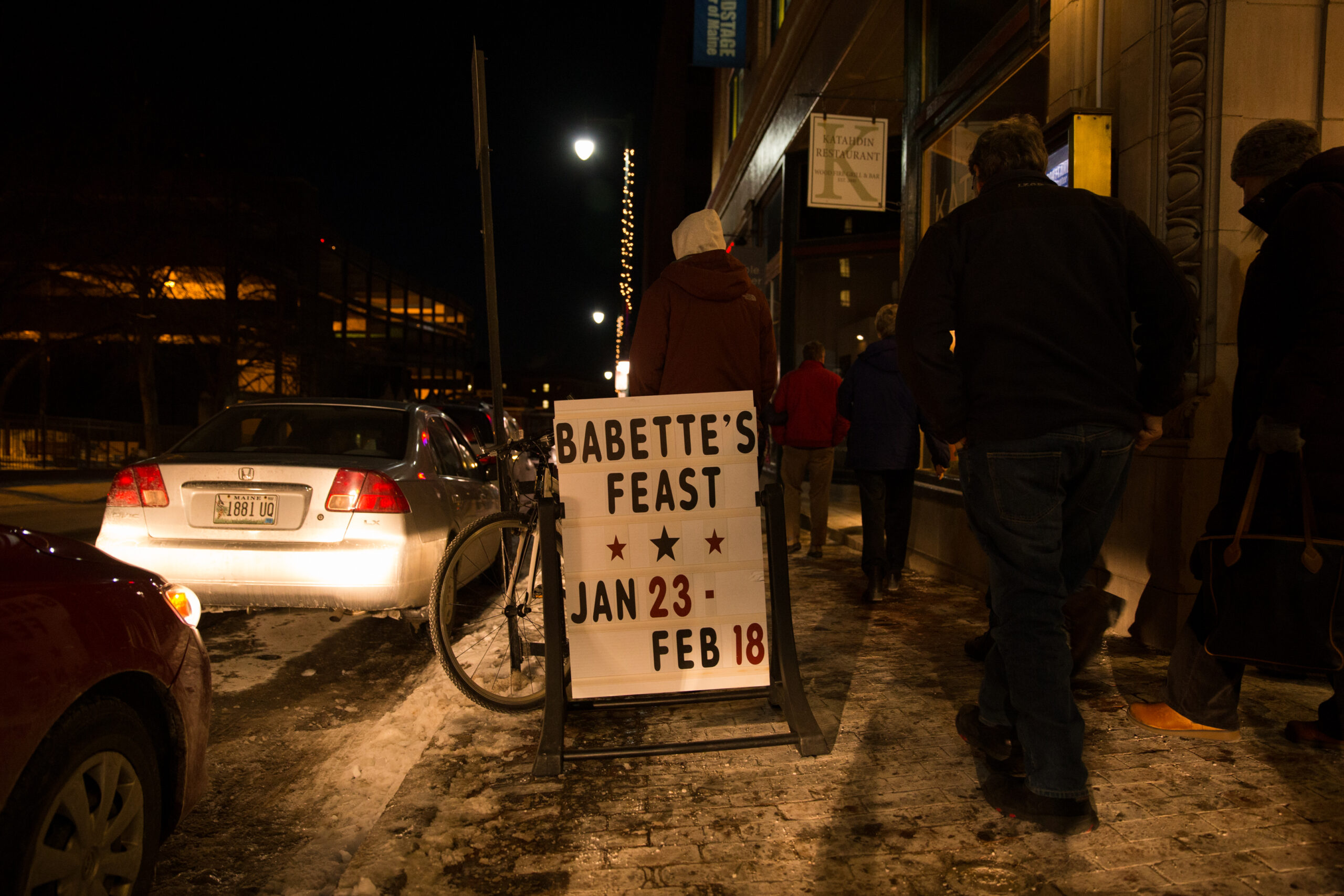‘Babette’s Feast:’ a taste of grace at Portland Stage
February 9, 2018
Associate Professor of Theater Abigail Killeen’s reimagining of the culinary splendor in “Babette’s Feast” was no easy task. A new adaptation of the story directed by Karin Coonrod, currently running at Portland Stage, focuses on a universal message of self-sacrifice and service.
Developed over the course of 11 years, the project began with a serendipitous discovery. Now on leave this academic year, Killeen first saw the Danish film, “Babette’s Feast,” adapted from Isak Dinesen’s short story, as an undergraduate student living in New York City.
“It was a sermon illustration at a church I was attending in the 90s, I was in college at [NYU],” said Killeen. “I first learned about it as an example of grace … Then about 10 years later I learned that the film was actually based on a short story … originally written in English and first published in America. That’s when I started to get interested in it theatrically.”
 Ann Basu
Ann BasuThe story, which takes place in a remote Norwegian town known as Berlevåg, traces the relationship between pious Protestant villagers and an outsider—a refugee called Babette, who flees from the bloodshed in Paris and is taken in by sisters Martine, portrayed by Killeen, and Philippa.
Babette stays in Berlevåg for 14 years working as the sisters’ cook, adhering to the town’s austere way of life. On the occasion of sisters’ father’s 100th birthday, Babette offers to prepare a real French dinner for the community at her own expense. Unaware that Babette has chosen to spend her entire earnings and sacrificed her chance to return home, the townspeople fear the sinful consequences of such luxurious indulgences.
While its cinematic counterpart exalts the gustatory pleasures of Babette’s feast, the play explores authorial intent in a different way.
“The film is a lot about food, and we can’t do that on stage … So what we focus on in the play is the fact that Babette is a refugee, and that she becomes an agent of grace and what that does to a community,” Killeen said.
Babette’s feast indeed becomes a joining together of seemingly irreconcilable opposites: pleasure and sacrifice, the exotic and the virtuous, the corporeal and the spiritual. She ultimately transforms the community’s judgement and asceticism with her generosity and selfless love, enabling them to witness the good.
“The people who believed they were demonstrating this service and [serving] the common good became the people who received the good from [someone] they thought they were helping. So it flows both ways … and the surprise of the story is that it comes back to the givers in a way they couldn’t have asked or imagined.”
“There’s a mystery to it and that I think is grace,” Killeen added.
Whether as a commentary on the refugee crisis, which the director underscores by casting a woman of color as Babette, or as a reminder of hospitality and kindness, the play offers many poignant insights. Much to Killeen’s delight, the production also turned out to be completely female-driven: the author, the director, the playwright, the artistic director of the theater, the three leads … The list goes on.
“The theater famously has shut doors to female theater artists and that hopefully is changing, but I feel particularly delighted to present this work that was born of women,” she said.
In honor of the project, Killeen and the team set out on an expedition from Paris to Norway and retraced Babette’s steps, which became crucial in setting the scene of the play. The stage evokes a sense of sparseness, with minimal decorations and clean contours that translate experiences of the bare Norwegian landscape.
“I think sometimes the story can be conceived as something sweet, or cozy, and what we learned was that the Norwegian landscape is brutal and fierce. That’s reflected in our design and in some of the performance that we’ve captured,” said Killeen.
Yet the space is simultaneously capable of being fully activated, thanks to Tony-Award winning Lighting Designer Christopher Akerlind and Assistant Professor of Dance Aretha Aoki. Fond of crossing the disciplines of theater and dance, Aoki remarked on the wonderful physicality the actors are able to embody.
“I’ve always enjoyed [collaborating with theater artists] because actors really immediately invest in the movement. I find that so satisfying. They know how to imbue physical material with a kind of inner life,” said Aoki.
As envisioned by Coonrod, Aoki choreographed movements that convey the transformative powers of Babette’s cooking. She also incorporated traditional Norwegian folk dance, congruent with the authenticity of the play’s experience.
“It’s called a Halling folk dance,” Aoki explained. “They’ve just finished this delicious meal, and they’re finally delighting in one another and there’s real joy in that section that needs to be communicated … this idea [that] in the community there’s this interdependency and that they become a community, finally, through the experience of eating Babette’s meal.”
As Dinesen herself put it, “The vain illusions of this earth had dissolved before their eyes like smoke and they had seen the universe as it really is. They had been given an hour of the millennium.”
“Babette’s Feast” opened on January 23 and will close on February 18 at Portland Stage. The play is expected to open at the St. Clements Theater in New York City.
CORRECTION Friday, February 2: A previous version of this article incorrectly stated that Associate Professor of Theater Abigail Killeen directed “Babette’s Feast.” The director of the play, as stated in the original article, is Karin Coonrod.


Comments
Before submitting a comment, please review our comment policy. Some key points from the policy: